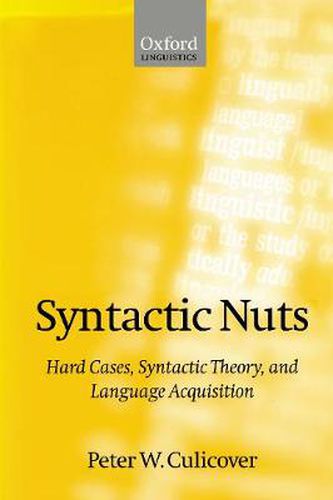Readings Newsletter
Become a Readings Member to make your shopping experience even easier.
Sign in or sign up for free!
You’re not far away from qualifying for FREE standard shipping within Australia
You’ve qualified for FREE standard shipping within Australia
The cart is loading…






This book investigates the architecture of the language faculty by considering what the properties of language reveal about the mental abilities and processes involved in language acquisition. The language faculty, the author argues, must be able not only to accommodate what is general, exceptionless, and universal in language, but must also be capable of dealing with what is irregular, exceptional, and idiosyncratic. In Syntactic Nuts Peter Culicover shows that this is true not only of the lexicon, but for syntax. \n\n Marginal and exceptional cases, where there is no straightforward form-meaning correspondence, are dealt with by the language faculty easily and precisely as the general cases. In considering how and why this should be the author argues against the prevailing trend in generative grammar, which takes the learner as either incorporating maximally global generalisations as part of its innate capacity for language, or projecting global generalisations from a very limited input on the basis of innate mechanisms. He suggests that the learning mechanism does not generalize significantly beyond the evidence presented to it, and further that it seeks to form generalizations based on all and only the evidence presented to it. \n\n Syntactic Nuts makes a fundamental contribution to generative grammar and syntactic theory. It situates syntactic theory within cognitive science in a novel way. It contributes to an alternative, and yet in many ways traditional, perspective on the manner in which knowledge is represented and processed in the mind.
$9.00 standard shipping within Australia
FREE standard shipping within Australia for orders over $100.00
Express & International shipping calculated at checkout
Stock availability can be subject to change without notice. We recommend calling the shop or contacting our online team to check availability of low stock items. Please see our Shopping Online page for more details.
This book investigates the architecture of the language faculty by considering what the properties of language reveal about the mental abilities and processes involved in language acquisition. The language faculty, the author argues, must be able not only to accommodate what is general, exceptionless, and universal in language, but must also be capable of dealing with what is irregular, exceptional, and idiosyncratic. In Syntactic Nuts Peter Culicover shows that this is true not only of the lexicon, but for syntax. \n\n Marginal and exceptional cases, where there is no straightforward form-meaning correspondence, are dealt with by the language faculty easily and precisely as the general cases. In considering how and why this should be the author argues against the prevailing trend in generative grammar, which takes the learner as either incorporating maximally global generalisations as part of its innate capacity for language, or projecting global generalisations from a very limited input on the basis of innate mechanisms. He suggests that the learning mechanism does not generalize significantly beyond the evidence presented to it, and further that it seeks to form generalizations based on all and only the evidence presented to it. \n\n Syntactic Nuts makes a fundamental contribution to generative grammar and syntactic theory. It situates syntactic theory within cognitive science in a novel way. It contributes to an alternative, and yet in many ways traditional, perspective on the manner in which knowledge is represented and processed in the mind.